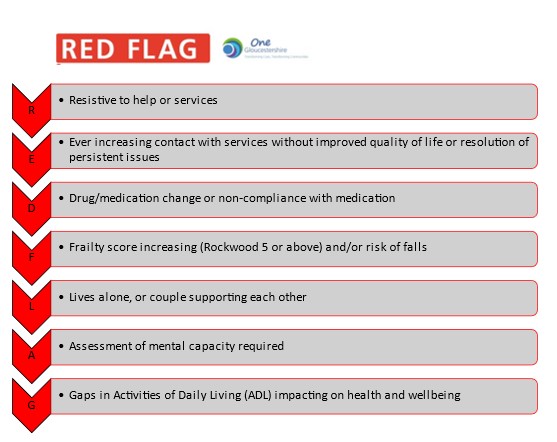On this page you will find advice and guidance on completing Comprehensive Geriatric Assessments, a holistic overview of an individual’s daily life and needs.
On this page...
Overview
A Comprehensive Geriatric Assessment (CGA) provides a holistic overview of an individual’s needs and concerns. It is a process that can be used from both a clinical and a non-clinical view. A CGA is something that is built to over time, covering a wide number of topics to give a holistic overview of that individual and what they need. It aims to reduce duplication so an individual has one CGA which, once completed, sits on their electronic patient record and can be accessed by all practitioners involved in that individuals care.
Triggering a CGA
It’s important to recognise when those living with frailty may need extra support, whether by spotting problems early or reacting promptly to new concerns. Noticing key signs helps make sure people get the right assessment and care. The red flag tool can help here.
Proactive Triggers for a CGA
Spotting needs before a crisis:
- Screening for Frailty: Regular checks for frailty, especially in those over 75.
- Recognised Risk Factors: Issues like frequent falls, memory problems, many medicines, weight loss, or old age.
- Transitions of Care: Changes such as hospital discharge or new home support.
- Long-term Condition Reviews: Adding CGA to ongoing reviews for conditions like diabetes or heart failure.
Reactive Triggers for a CGA
When new or sudden problems arise:
- Recent Hospitalisation: Unplanned admissions or frequent urgent care visits.
- Sudden Functional Decline: New problems with movement or self-care.
- Acute Illness: New confusion, unexplained decline, or falls.
- Family or Carer Concern: Worries about rapid changes or increased needs.
- Medication Issues: Problems from medicines, such as confusion or side effects.
Red Flag Tool:
The Red flag checklist (below) is a handy reminder as it summarises these triggers to help practitioners promptly refer patients for a CGA, ensuring those most at risk receive swift identification and support—whether problems are caught early or arise suddenly.

Mental capacity assessment
If there are concerns about cognitive function, it is important to consider mental capacity which might influence subsequent care and support planning.
The principles of the Mental Capacity Act (England Wales) 2005 are:
- Assume capacity
- Help people to have capacity in all practical ways before deciding they do not have capacity
- People are entitled to make unwise decisions
- Decisions for people without capacity should be in their best interest and the least restrictive possible
It is however also important to remember that capacity may fluctuate and that it is time and decision specific.
All health and social care professionals must recognise their responsibilities with respect to mental capacity and be prepared to reassess capacity if the situation changes.
Nutrition and hydration
Nutrition is an important determinant of health in persons over the age of 65. Malnutrition in the elderly is often under diagnosed. Careful nutritional assessment is necessary for both the successful diagnosis and development of comprehensive treatment plans for malnutrition in this population. Weight loss is a characteristic feature of frailty as muscles become thinner and weaker, which is referred to as sarcopenia.
The below G-Care link contains a printable version of the Malnutrition ‘Food First’ pathway:
https://g-care.glos.nhs.uk/pathway/401/resource/11#chapter_5991
Socialising, community and isolation
The question ‘do you feel lonely?’ reminds us that being housebound is a risk factor for loneliness and that loneliness itself is a risk factor for depression, poor sleep, impaired thinking skills, higher use of health care with more GP visits, increased use of medication and higher incidence of falls.
- 59% of older adults who report poor health say they feel lonely some of the time or often compared with 21% who report excellent health
- People who are socially isolated visit their GP more often and use more medication
- Lacking social connections is a comparable risk factor for early death to smoking 15 cigarettes a day and is worse for our health than obesity and physical inactivity
- Social isolation is one of the top five causes for admissions to care homes
Guidance
Training
Before completing your first CGA, it is recommended to undertake the following training courses.
- Motivational Interviewing conversations
- Health Coaching training
Please speak with your Line Manager for further information on these courses.
Example CGAs
- A good example from a clinical view:
Example CGA – good example - A good example from a holistic non-clinical view:
Example CGA – holistic approach - A poor example:
Example CGA – poor example
Template – coming soon…
Work is on-going on the development of a countywide template for completing CGAs.
Prompt Questions
Consider the following prompt questions when completing a CGA:
- How do you sleep? Tell me about any issues you have waking up in the night?
- How many falls have you had in the last 12 months?
- How is your diet? Are you a vegetarian or vegan? Tell me about eating? Can you tell me about any issues you have had swallowing?
- When did you last go to the dentist?
- When did you last have a hearing test?
- When did you last have an eyesight test?
- Tell me about any issues you have with continent products?
- When did you last get your toenails cut?
- Does your mood differ depending on the time of day?
- How do you find making decisions at the moment?
- Tell me about any medication you have at the moment?
- Do you feel lonely?
Assessment considerations
5 Frailty Syndromes
- Reduced Mobility – Expectations, goals and choices, limitations, Management of existing LTC’s, Carer impact, Pain, Homeostasis – anaemia, thermoregulation
- Falls – Falls and bone protection, sarcopenia, movement and safety
- Weight Loss – Smoking and alcohol, Malnutrition, Bowel health, Urinary health
- Polypharmacy – Medications and condordance, vaccinations, Foot care, skin integrity
- Cognition – Sensory, Anxiety and depression, Social activity and loneliness, ADLs (activities daily living), End of life, Spirituality, Financial impact/deprivation
British Geriatric Society CGA Toolkit
For more information on CGAs, take a look at the BGS CGA Toolkit. This is extremely comprehensive and goes into more depth:
https://www.bgs.org.uk/cgatoolkit
The BGS site also contains a wealth of information on identifying frailty. A community first approach is crucial to the management of frailty to ensure people stay happier and healthier for longer at home. See below link to more information from BGS on recognising frailty:
https://www.bgs.org.uk/resources/recognising-frailty
